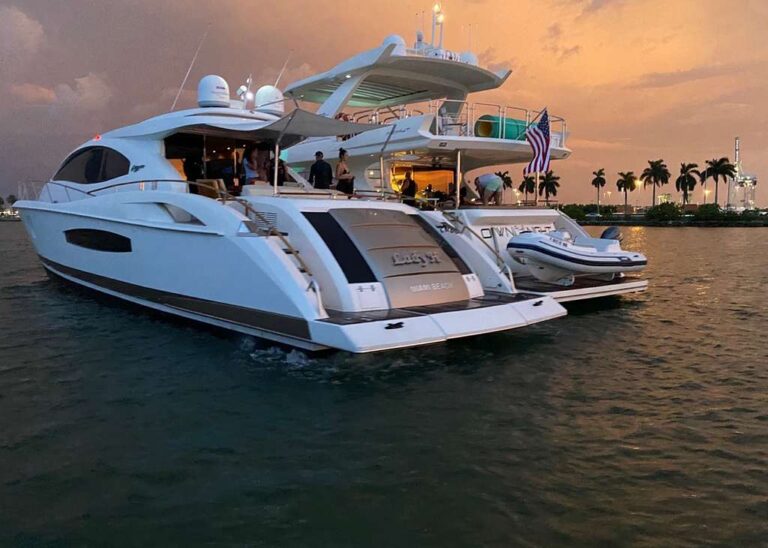What Is the Process of Obtaining a Yacht License
Setting sail on the open sea, feeling the wind in your hair and embracing the allure of limitless horizons – the mere thought of owning a yacht is captivating. While most of us dream of cruising the deep blue waters, there is a world of regulations and requirements that lie between us and our maritime escapades. Whether you aspire to captain your own luxury vessel or simply wish to navigate the sea like a skilled mariner, understanding the process of obtaining a yacht license is the crucial first step on this exhilarating journey. In this article, we unravel the labyrinthine world of yacht licensing, navigating through the necessary qualifications, examinations, and practical experience required to commandeer your own floating oasis. So, summon your inner sailor, as we embark on a voyage to uncover the mysterious world of obtaining a yacht license.
Table of Contents
- Determining the Requirements: Understanding the Prerequisites for Obtaining a Yacht License
- Researching Certification Bodies: Exploring Accredited Organizations to Obtain Your Yacht License
- Selecting the Appropriate Yacht License: Navigating the Different Types of Certifications
- Understanding the Training Process: From Theory to Practical Skills
- Preparing for the Examination: Tips and Resources for Successfully Passing the Yacht License Test
- Maintaining and Renewing Your Yacht License: Staying Compliant and Up-to-Date with Regulations
- FAQs
- Closing Remarks

Determining the Requirements: Understanding the Prerequisites for Obtaining a Yacht License
Obtaining a yacht license is an exciting endeavor, but it requires fulfilling a set of prerequisites. To ensure a smooth and successful licensing process, it is vital to understand the requirements beforehand. Here are the key prerequisites for obtaining a yacht license:
- Age Limit: Applicants must be at least 18 years old to apply for a yacht license.
- Experience: A certain level of sailing experience is typically required, such as a minimum of 50 hours on a yacht. This allows individuals to demonstrate their competence and familiarity with handling a vessel.
- Training and Education: Completion of a recognized yacht training program or courses is necessary. These courses cover topics like navigation, safety procedures, and marine regulations.
- Medical Fitness: Applicants must provide a medical examination certificate issued by an approved medical professional. This ensures that they are physically fit to operate a yacht and can handle potential challenges at sea.
- Theoretical Knowledge: Passage of a theoretical examination is often mandatory, which assesses understanding of navigation, meteorology, and other essential aspects related to yacht operation.
By meeting these prerequisites, individuals can embark on their journey toward obtaining a yacht license and delve into the exhilarating world of yachting. It is crucial to thoroughly review these prerequisites and fulfill any additional criteria specific to the licensing authority or region of application.
Researching Certification Bodies: Exploring Accredited Organizations to Obtain Your Yacht License
When embarking on your journey to obtain a yacht license, it is crucial to thoroughly research and explore the numerous accredited organizations that offer certifications. By diving into the world of certification bodies, you can ensure that you choose the most reputable and trustworthy organization to obtain your license from. Here are a few key considerations to guide your research:
- Accreditation: Look for certification bodies that are accredited by recognized authorities in the maritime industry. Accreditation ensures that the organization meets high standards for training, assessment, and certification processes.
- Curriculum: Evaluate the curriculum offered by each certification body. Seek a comprehensive program that covers all necessary theoretical knowledge and practical skills to confidently handle a yacht at sea.
- Practical Experience: Consider the opportunities provided by the organization to gain hands-on experience. Practical training and sea time are crucial components of learning to operate a yacht safely and efficiently.
- Reputation: Explore the reputation of the certification bodies you are considering. Read reviews, seek recommendations from experienced sailors, and inquire about their track record for producing competent yacht captains.
- Additional Training: Some certification bodies offer supplementary courses, such as advanced navigation techniques, emergency response, and maintenance skills. Assess if these additional training opportunities align with your long-term goals as a yacht operator.
By meticulously researching and comparing different certification bodies, you can make an informed decision that nurtures your passion for sailing and ensures a solid foundation for a successful career at sea.
Selecting the Appropriate Yacht License: Navigating the Different Types of Certifications
Welcome aboard the journey to uncovering the perfect yacht license for your seafaring ambitions! As you set sail in the vast ocean of certifications, it’s essential to navigate the varying types to land on the one that suits your boating desires. Let’s explore the fascinating array of options that lie ahead:
- Recreational Skipper’s Ticket (RST): Ideal for those looking to explore local waters, this license allows you to captain boats up to a specified size, as dictated by your country’s regulations.
- Coastal Skipper: For those craving a taste of adventure, the Coastal Skipper license grants you the ability to sail up to 200 nautical miles from the coast, venturing further and discovering new horizons.
- Yachtmaster Offshore: Embark on unforgettable voyages with this prestigious license, enabling you to navigate in any ocean while commanding vessels up to a substantial size.
These are just a few highlights from the treasure trove of yacht licensure options. Each certification bears unique responsibilities, opening doors to incredible experiences and unforgettable moments at sea. Whether you seek to master serene lakes, meandering coastlines, or boundless oceans, there’s a license tailored to your aspirations. Bon voyage!

Understanding the Training Process: From Theory to Practical Skills
In order to solidify theoretical knowledge and transform it into practical skills, a well-structured training process is essential. This process involves several key elements that work together harmoniously to ensure effective learning and skill development:
- Theoretical Foundations: The first step in the training process is to establish a solid understanding of the theoretical concepts and principles underlying the skill set. This may involve studying relevant literature, attending lectures or workshops, or engaging in online courses.
- Hands-on Experience: Theory alone is not enough. The training process should facilitate hands-on experience, allowing trainees to actively apply what they have learned in a practical setting. This might involve simulation exercises, case studies, or real-life scenarios.
- Feedback and Evaluation: Constructive feedback is crucial for improvement. The training process should incorporate regular evaluation sessions where trainers assess trainees’ progress and provide guidance for areas that require further attention.
- Repetition and Practice: Mastery of skills requires repetition and practice. The training process should encourage trainees to consistently repeat tasks, allowing them to hone their abilities and build muscle memory.
By understanding the training process and its components, individuals can approach learning with a clear roadmap for acquiring and refining practical skills. Embracing both theory and practice, learners will be well-equipped to excel in their chosen field.

Preparing for the Examination: Tips and Resources for Successfully Passing the Yacht License Test
Successfully passing the Yacht License Test requires diligent preparation and a solid understanding of both theory and practical skills. Here are some helpful tips to ensure your success:
- Study the official materials: Start by thoroughly reviewing the official study materials provided for the examination. These materials will cover the necessary theoretical knowledge, rules, and regulations you need to know.
- Take practice tests: Familiarize yourself with the exam format and questions by taking practice tests. This will help you identify any weak areas and allow you to focus on improving them.
- Utilize online resources: The internet is a treasure trove of resources for aspiring yacht license holders. Take advantage of online forums, discussion groups, and informational websites to broaden your knowledge and gain insights from experienced sailors.
- Enroll in a preparation course: Consider enrolling in a yacht license preparation course. These courses are designed to provide comprehensive training, practical demonstrations, and expert guidance to enhance your understanding and skills.
- Get hands-on experience: Put your theoretical knowledge into practice by gaining as much hands-on experience as possible. Consider volunteering or working on a yacht to refine your sailing techniques and increase your familiarity with different scenarios.
By following these tips and utilizing the available resources, you’ll be well-prepared to tackle the Yacht License Test with confidence and increase your chances of success.

Maintaining and Renewing Your Yacht License: Staying Compliant and Up-to-Date with Regulations
Maintaining and renewing your yacht license is essential to ensure that you remain compliant with the ever-changing regulations in the maritime industry. To stay on top of your licensing responsibilities, here are some key tips to consider:
- Stay informed: Regularly stay updated with the latest regulations and requirements set by the maritime authorities. This can be done by attending industry conferences, subscribing to relevant newsletters, and following reputable maritime websites.
- Adhere to renewal deadlines: Keep track of your license’s expiration date and make sure to initiate the renewal process well in advance. Failing to renew on time could result in penalties or suspension of your license.
- Complete required training: Many license renewals require proof of completion of training courses. Stay proactive by completing the necessary training and keeping your certifications up-to-date.
- Maintain records: Keep meticulous records of your license, training certificates, and any other relevant documentation. Having organized records will make the renewal process smoother and provide you with easy access to crucial information when needed.
- Engage with professionals: Consult with experienced professionals in the maritime industry, such as maritime lawyers or licensing specialists. Their expertise can help you navigate the complexities of license maintenance and renewal, ensuring you stay compliant.
By staying compliant and up-to-date with regulations, you not only uphold the credibility of your yacht license but also prioritize safety and professionalism in your maritime endeavors.
FAQs
FAQs – What Is the Process of Obtaining a Yacht License?
Q: What is a yacht license?
A: A yacht license, also known as a yachtmaster certificate, is an official document that certifies an individual’s competency to operate a yacht. This license proves that you possess the necessary skills, knowledge, and experience to safely navigate and control a yacht.
Q: Why do I need a yacht license?
A: Obtaining a yacht license is crucial if you wish to navigate a yacht legally and responsibly. Without a yacht license, you may not be able to charter a yacht, sail in certain waters, or pursue a career within the yachting industry.
Q: Who can apply for a yacht license?
A: Anyone who meets the minimum age and experience requirements can apply for a yacht license. The specific requirements may vary depending on the country or governing body offering the license. Generally, you must have a certain number of nautical miles logged and complete the necessary training and exams.
Q: What are the steps involved in obtaining a yacht license?
A: The process of obtaining a yacht license usually involves the following steps:
1. Meet the minimum age requirement – typically 18 years or older.
2. Gain the necessary experience – usually measured in nautical miles. The exact number varies depending on the type of license being pursued.
3. Complete the relevant training courses – these courses cover topics such as navigation, safety, engine maintenance, and seamanship.
4. Pass the required exams – these exams usually consist of written and practical assessments to test your knowledge, skills, and decision-making abilities.
5. Submit an application – once you have fulfilled all the prerequisites, you can submit an application for a yacht license.
6. Pay the necessary fees – there may be fees associated with the application, training courses, and exams.
7. Await approval – the licensing authority will review your application, and if successful, you will be issued a yacht license.
Q: How long does it take to obtain a yacht license?
A: The time it takes to obtain a yacht license varies depending on several factors, including your prior experience, the type of license you are pursuing, the availability of training courses, and how quickly you can schedule and pass the required exams. Typically, the process can take anywhere from a few weeks to several months.
Q: Can I obtain a yacht license if I have no prior boating experience?
A: Yes, it is possible to obtain a yacht license without prior boating experience. Most licensing bodies offer different levels of licenses, starting from beginner levels for individuals with little to no experience. These beginner levels often require completing specific training courses and passing exams to acquire the necessary knowledge and skills.
Q: Is a yacht license valid globally?
A: While a yacht license obtained in one country may be recognized and accepted in many others, it’s essential to check the specific regulations and requirements of the intended cruising area. Some countries require additional endorsements or certifications for specific waters or yachts of a certain size.
Q: What can I do with a yacht license?
A: With a yacht license, you can operate a yacht for personal use, rent a yacht for a vacation, work as a professional crew member, or even pursue a career in the yachting industry. The possibilities are numerous, and a yacht license opens up opportunities for adventures on the open seas.
Q: Does a yacht license expire?
A: Yes, yacht licenses typically expire after a certain period, which can range from a few years to a decade, depending on the issuing authority. To maintain a valid license, you may be required to renew it by fulfilling certain requirements such as updating your experience, attending refresher courses, or passing additional exams.
Q: Can I upgrade my yacht license?
A: Yes, if you hold a lower-level yacht license, it is often possible to upgrade to a higher level by meeting the additional requirements set by the licensing authority. This may involve gaining further experience, completing advanced training courses, and passing more challenging exams.
Remember, specific procedures and requirements for obtaining a yacht license may vary depending on your location and the governing body responsible for issuing the license. Always consult the relevant authorities or seek professional guidance to ensure you have accurate and up-to-date information. Bon voyage!
Insights and Conclusions
As we conclude our journey into the captivating world of yacht licensing, may you now find yourself equipped with a newfound understanding of the process that lies beneath its shimmering surface. From the initial spark of curiosity to the triumphant moment of hoisting your license high, navigating the seas of bureaucracy and knowledge has proven that preparing for adventure is no child’s play.
Like the gentle caress of the wind on your face, the path to obtaining a yacht license requires patience, dedication, and unwavering focus. It is a voyage that demands both mental fortitude and a thirst for acquiring nautical expertise. At times, you may feel as though the waves are crashing against your very determination, but worry not, dear reader, for perseverance shall be your guiding light.
The process unfurls like a picturesque sunrise, gradually illuminating the steps you must take. Casting off on this odyssey, you begin by acquiring the necessary qualifications, honing your nautical knowledge like a sailor guiding his vessel through treacherous waters. Comprehensive training and examinations will act as your compass, ensuring that the art of sailing pulses through your veins.
Within the realm of bureaucracy, the paperwork dances in a symphony of administrative details, requiring your hand to deftly steer through the intricacies of licenses, permits, and endorsements. Patience becomes your celestial North Star, guiding you through the labyrinth of forms and regulations that stand as gatekeepers to your maritime ambitions.
As the winds of time carry you forward, charting distant horizons and welcoming you into the embrace of blue depths, the final phase of your journey awaits. A diligent review by the powers that be will test your mettle. They will inspect your vessel, scrutinizing your skills to confirm that you possess an unwavering ability to command the seas with the utmost responsibility.
With your heart set on conquering the vast oceanic playground, emerging on the other side gripping that coveted yacht license, the world of endless possibilities unfurls before you. Eager to sail under the sun’s warm gaze, you become the embodiment of freedom as your vessel glides effortlessly across the water’s surface.
So, dear reader, let the stars guide your efforts, let the wind fill your sails of determination, and let the rhythm of the waves propel you towards this great milestone. For the process of obtaining a yacht license is not merely acquiring a piece of paper; it is a transformation, a newfound connection to the vastness of the sea, and the realization that adventure – with its unpredictable currents and endless horizons – awaits those who dare to dream.







